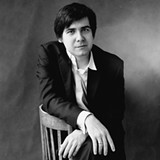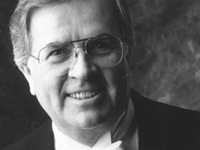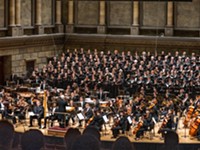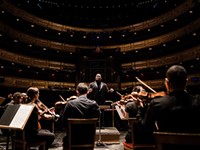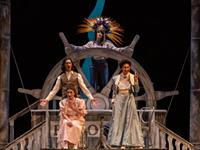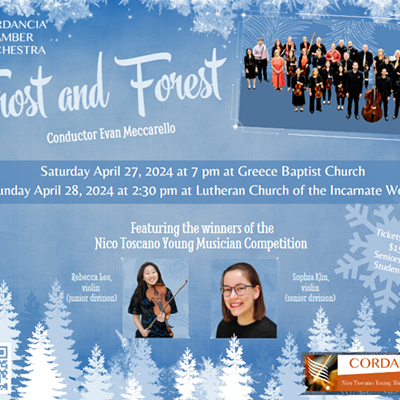[
{
"name": "500x250 Ad",
"insertPoint": "5",
"component": "15667920",
"parentWrapperClass": "",
"requiredCountToDisplay": "1"
}
]
Two prizewinners joined forces last week as guest artists with the Rochester Philharmonic Orchestra. Conductor José Luis Gomez won the Georg Solti competition in 2010; pianist Vadym Kholodenko won the gold medal at the Van Cliburn International Piano Competition in 2013. They made an impressive team in a front-loaded program that put the heaviest, or at least the loudest, artillery in the first half.
Richard Strauss's tone poem "Death and Transfiguration" has always struck me as pompous and rather empty, though being by Strauss, it has its share of luscious and dramatic moments. Gomez certainly made it listenable: he paced this piece expertly and never wallowed in Strauss's rich orchestration. The last few minutes in particular came off handsomely, with a solid, glowing sound featuring some sonorous brass playing. I can look forward to my own transfiguration, if it sounds anything like this.
Vadym Kholodenko chose an unusual vehicle for his RPO debut. Sergei Prokofiev's Second Piano Concerto has an interesting history: he wrote it in 1913, while he was still a student, and first performed it amid great controversy. ('A Babel of insane sounds heaped upon one another without rhyme or reason," wrote one of the more temperate reviewers.) Prokofiev left the score behind when he left Russia in 1917, and it seems to be lost; he reconstructed it from memory and re-premiered the piece in Paris in 1923, to equal bewilderment. Since then this concerto has been on the fringes of the repertory – the RPO last performed it 30 years ago, with Horacio Gutierrez.
Prokofiev was a more experienced composer when he rewrote his Second Concerto, but he wisely kept a lot of the crazy in. Instead of the usual three movements, it is in an oddly proportioned four: long and rather ungainly opening and closing movements bookend two smaller ones. Prokofiev is definitely playing the enfant terrible in this bizarre but bracing music. The concerto starts with a broad melody for the piano that Rachmaninoff wouldn't have sniffed at, but the younger composer soon comes into his own, piling grotesque orchestral effects and unending keyboard demands on top of slamming rhythms and grinding dissonances.
It's exciting if mostly rather cold music, but it couldn't be by anybody but Prokofiev, and it offers many opportunities to an iron-fingered virtuoso – not to mention an orchestra on its toes. Gomez and the RPO dug into the grotesquerie of this music – shrieking flutes, thudding percussion, cellos and basses lumbering like dinosaurs – very entertainingly.
Kholodenko played that opening melody with pleasing restraint, but when the music heated up, his temperature rose as well – up to a point. Kholodenko has a big but controlled sound, with no banging; in fact, he tosses off the hair-raising runs and leaps of Prokofiev's endlessly inventive piano writing effortlessly. He seemed to be aiming for clarity and a certain dryness – perhaps emulating Prokofiev himself, whose recordings as a pianist similarly demonstrate great virtuosity and a reluctance to linger. Kholodenko is recording all the Prokofiev piano concertos, and I would be interested in hearing him play the rest of them – or in hearing him play most anything else, since he's obviously got the goods.
Mozart's "Jupiter" Symphony, the second half of the program, required a pared-down RPO – double winds (but only a single flute) and what seemed like a handful of strings after Richard Strauss and Prokofiev. The RPO does not seem to have played much Mozart lately, but you'd never have guessed it: this performance was alert and deft, featuring some silky string playing and beautiful woodwind work, all the more enjoyable for being so clearly exposed. Gomez took quick tempos throughout the symphony – the Andante proceeded at a tempo faster than I think I have ever heard it played, but it came off elegantly, particularly the violins' ornamentation during the repetitions of the main theme.
The smallish orchestra brought a proper energy and a touch of grandeur to the finale of the symphony. This movement is a festival of what used to be termed "learned counterpoint"; Mozart effortlessly combines and recombines five different themes, bringing them all together in the home stretch. It's learned, all right, but it is also one of the most exhilarating movements in music. It was worth attending this concert just to hear this finale, though there were plenty more fine musical moments beforehand.
